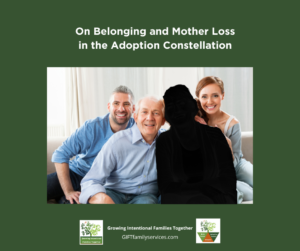 February is almost upon us. It is synonymous with thoughts of celebrating the joy of being loved, seen and valued for one’s genuine self.
February is almost upon us. It is synonymous with thoughts of celebrating the joy of being loved, seen and valued for one’s genuine self.
Belonging
Is a fundamental human need rooted in the primal urge to survive. Human beings learned that being a part of a group dramatically improved the chances of survival. This explains why being ostracized from one’s group is so emotionally and physically devastating. Parallels can be drawn in the way adoption moves a child out of their birth family. At some level, this separation is experienced as the ultimate ostracism. The child feels it physically, emotionally, and psychologically. Most spend a lifetime time trying to discern who they are, where they belong, and what they can do to avoid ever being “unclaimed” and cast out again.
Yearning for home
Adoptees say they yearn to feel at rest, at peace, and at ease in their lives. All of which are alternate ways of saying they want to feel at home and accepted fully as themselves in their adoptive families–not as a proxy of the child their parents couldn’t conceive, nor as their parents’ dream come true, but simply as a unique, loveable, complex human being.
This yearning is distinct from the longing for a familiar place called home. It is much more about a sese of psychological fit, security, and welcome. This need is wired into the human brain.
For example, it is well documented that in Alzheimer’s patients, even as their brains deteriorate, they express frequent pleas to “go home.” Often this occurs even when they are already in their home. Like all humans, adoptees also experience this primal urge for “home.”.
Honoring connection
For adoptive persons, family is a complex tapestry. It includes both biological and adoptive relationships. Some adoptees’ birth families are known, acknowledged and present in the adoptee’s life. For others, intimacy falls along a spectrum. Birth family may be nominally present, at a remove, or completely unknown.
Birth family relationships have a significant impact on the adoptee biologically, emotionally, and psychologically. Whether the connection is intimate or casual, they matter to the adoptee. So, of course these relationships matter to the adoptive parents as well.
Adoptees do best when adoptive families recognize and nurture their child’s relationships with birth family. When the two families work together to support the child they all love, the child fares better.
The doubling effect
The plus side of having four parents in their lives means adoptees have more people to cheer them on, to love them and to support them. The flip side of that is the reality that none of us live forever. So, one day, adoptees must grieve the death of each of their four parents. Each loss reverberates to awaken echoes of other losses.
Obviously, this is another quite complicated situation. In their most recent vlog, our coaches Sharon Butler-Obazee (an adoptee) and Sally Ankerfelt (an adoptive parent,) discussed this sensitive topic. Please watch or listen to their conversation about coping with the loss of one’s mother. It will provide you with some insights and ideas for how you might support the adoptees that you know and love.
__________________________
-
- Call us at 1-800-653-9445
- Listen to our podcasts: Adoption Matters: Real People. Real Life. Real Talk and Essentials of Adoption Attuned Parenting
- Watch our YouTube channel
- Read Books written by our coaches
- Click to learn more about Adoption Attuned Certified coaching!
- Check out our on-demand courses.


